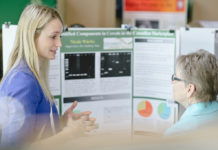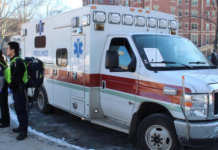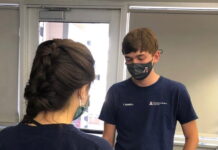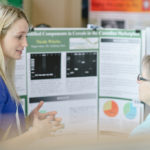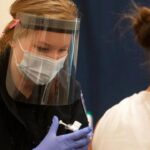Poster Presentation Abstract
Introduction: During large-venue events, EMTs must manage a multitude of patients using limited resources. Loud music, darkness, and dense crowds make it difficult to locate and treat guests effectively. Boston University Emergency Medical Services (BUEMS), a student-staffed BLS service, provides coverage for Agganis Arena, which hosts large-scale events for thousands. Agganis hosted 44% more concerts and shows in 2019 than 2018 and saw a surge of EMS calls, leaving new EMTs unprepared. Since any BUEMS EMT was eligible to work Agganis shifts, inexperienced EMTs were expected to manage emergencies without senior support. New hires reported feeling only 30% prepared to work at the arena, as conventional EMS education focuses mainly on single-patient ambulance transfers.
Program Development & Implementation: In response, we established a new training program to improve the quality of our services. Eleven New Agganis EMTs (NA-EMT) were required to attend a large-venue specific orientation and were continuously trained, mentored, and monitored by Agganis Experienced EMTs (AE-EMT) during all shifts. NA-EMTs were required to work at least 8 shifts, write 5 high-quality PCRs, and receive supervisor recommendations to qualify for an AE-EMT promotion. All BUEMS staff were required to attend a yearly large-venue inservice, beginning in April 2019, which included simulated medical and extrication scenarios. During the orientation and inservice, our staff was prepared to triage, extricate, and provide hands-on care to multiple simulated patients within the venue, all while retaining effective communication in the difficult environment.
Program Evaluation: Anonymous Likert scale and free-response surveys were completed by Fall 2019 BUEMS Agganis staff. All NA-EMTs found the orientation helpful in preparing for Agganis shifts. NA-EMTs were 44% more prepared (p < 0.001) to work shifts and 29% better (p < 0.01) at providing patient care compared to new staff before the orientation was implemented, as evaluated by AE-EMTs. During shifts, 100% of AE-EMTs provided further training to NA-EMTs on operations, venue layout, patient care, and writing PCRs. AE-EMTs reported a 77% (SD=22%) increase in team dynamics and 70% (SD=14%) increase in patient care efficiency as a result of the mentorship program. All surveyed staff found the inservice to be 83% (SD=10%) beneficial, with a 79% (SD=12%) increase in team dynamics as a result of the training.
Discussion/Conclusions: New protocols have promoted better team dynamics, higher staff confidence, and more efficient patient care. This program has enhanced the preparation of all staff in managing the difficulties of large-venue logistics and can be implemented into other collegiate EMS systems to improve their own large-venue operations.
View Poster (PDF)
Author & Article Information
Author Affiliations: From Boston University Emergency Medical Services; Boston University Emergency Response Education – both in Boston, MA, USA (E.P. & E.E.). From Boston University Emergency Medical Services – in Boston, MA, USA (S.G.).
Address for Correspondence: Enzo Plaitano, EMT | Email: enzop@bu.edu
Conflicts of Interest/Funding Sources: By the JCEMS Submission Declaration Form, all authors are required to disclose all potential conflicts of interest and funding sources. The authors declared that they have no conflicts of interest. The authors declared that they did not receive funding to conduct the program or research associated with this work.
Ethical Compliance: The authors attest that the research associated with this abstract was conducted in accordance with the JCEMS Ethics Guidelines.
Submission History: Received December 4, 2019; accepted for presentation and publication February 7, 2020.
Poster Presentation: This abstract was presented as a poster at the Academic Poster Session of the 27th Annual Conference of the National Collegiate Emergency Medical Services Foundation; February 29, 2020; Boston, MA, USA.
Published Online: December 31, 2020
Published in Print: December 31, 2020 (Volume 3: Issue 2)
Reviewer Information: In accordance with JCEMS editorial policy, poster presentation abstracts undergo double-blind peer-review by at least two reviewers (JCEMS Editorial Board members and/or independent reviewers) prior to acceptance for presentation and publication. JCEMS thanks the anonymous reviewers who contributed to the review of this work.
Copyright: © 2020 Plaitano, Everett & Golden. This is an open access article distributed under the terms of the Creative Commons Attribution 4.0 International (CC BY 4.0) License, which permits unrestricted use, distribution, and reproduction in any medium, provided the original author and source are credited. The full license is available at: https://creativecommons.org/licenses/by/4.0/
Electronic Link: https://doi.org/10.30542/JCEMS.2020.03.S1.07

